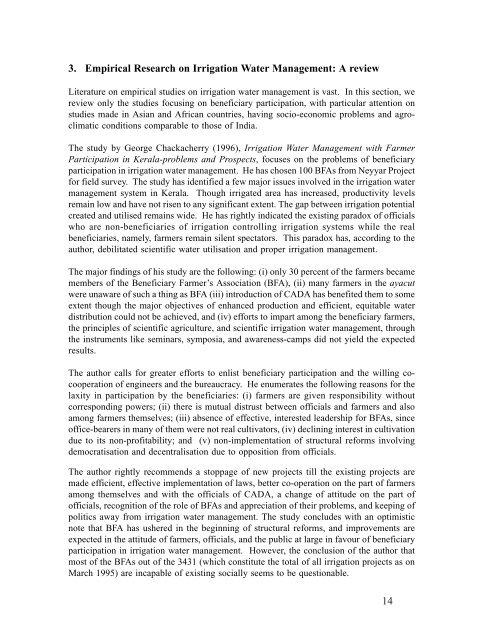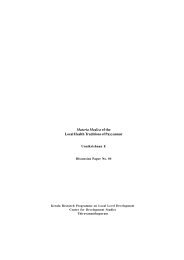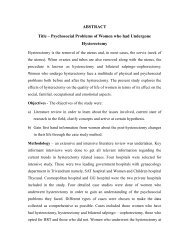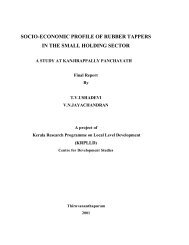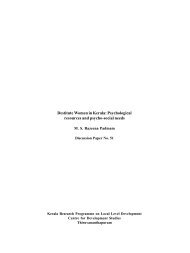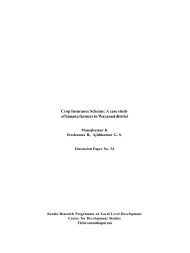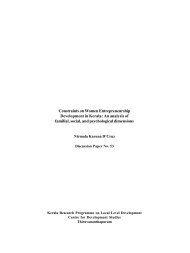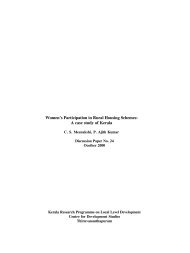Beneficiary Participation in Irrigation Water Management: The Kerala
Beneficiary Participation in Irrigation Water Management: The Kerala
Beneficiary Participation in Irrigation Water Management: The Kerala
You also want an ePaper? Increase the reach of your titles
YUMPU automatically turns print PDFs into web optimized ePapers that Google loves.
3. Empirical Research on <strong>Irrigation</strong> <strong>Water</strong> <strong>Management</strong>: A review<br />
Literature on empirical studies on irrigation water management is vast. In this section, we<br />
review only the studies focus<strong>in</strong>g on beneficiary participation, with particular attention on<br />
studies made <strong>in</strong> Asian and African countries, hav<strong>in</strong>g socio-economic problems and agroclimatic<br />
conditions comparable to those of India.<br />
<strong>The</strong> study by George Chackacherry (1996), <strong>Irrigation</strong> <strong>Water</strong> <strong>Management</strong> with Farmer<br />
<strong>Participation</strong> <strong>in</strong> <strong>Kerala</strong>-problems and Prospects, focuses on the problems of beneficiary<br />
participation <strong>in</strong> irrigation water management. He has chosen 100 BFAs from Neyyar Project<br />
for field survey. <strong>The</strong> study has identified a few major issues <strong>in</strong>volved <strong>in</strong> the irrigation water<br />
management system <strong>in</strong> <strong>Kerala</strong>. Though irrigated area has <strong>in</strong>creased, productivity levels<br />
rema<strong>in</strong> low and have not risen to any significant extent. <strong>The</strong> gap between irrigation potential<br />
created and utilised rema<strong>in</strong>s wide. He has rightly <strong>in</strong>dicated the exist<strong>in</strong>g paradox of officials<br />
who are non-beneficiaries of irrigation controll<strong>in</strong>g irrigation systems while the real<br />
beneficiaries, namely, farmers rema<strong>in</strong> silent spectators. This paradox has, accord<strong>in</strong>g to the<br />
author, debilitated scientific water utilisation and proper irrigation management.<br />
<strong>The</strong> major f<strong>in</strong>d<strong>in</strong>gs of his study are the follow<strong>in</strong>g: (i) only 30 percent of the farmers became<br />
members of the <strong>Beneficiary</strong> Farmer’s Association (BFA), (ii) many farmers <strong>in</strong> the ayacut<br />
were unaware of such a th<strong>in</strong>g as BFA (iii) <strong>in</strong>troduction of CADA has benefited them to some<br />
extent though the major objectives of enhanced production and efficient, equitable water<br />
distribution could not be achieved, and (iv) efforts to impart among the beneficiary farmers,<br />
the pr<strong>in</strong>ciples of scientific agriculture, and scientific irrigation water management, through<br />
the <strong>in</strong>struments like sem<strong>in</strong>ars, symposia, and awareness-camps did not yield the expected<br />
results.<br />
<strong>The</strong> author calls for greater efforts to enlist beneficiary participation and the will<strong>in</strong>g cocooperation<br />
of eng<strong>in</strong>eers and the bureaucracy. He enumerates the follow<strong>in</strong>g reasons for the<br />
laxity <strong>in</strong> participation by the beneficiaries: (i) farmers are given responsibility without<br />
correspond<strong>in</strong>g powers; (ii) there is mutual distrust between officials and farmers and also<br />
among farmers themselves; (iii) absence of effective, <strong>in</strong>terested leadership for BFAs, s<strong>in</strong>ce<br />
office-bearers <strong>in</strong> many of them were not real cultivators, (iv) decl<strong>in</strong><strong>in</strong>g <strong>in</strong>terest <strong>in</strong> cultivation<br />
due to its non-profitability; and (v) non-implementation of structural reforms <strong>in</strong>volv<strong>in</strong>g<br />
democratisation and decentralisation due to opposition from officials.<br />
<strong>The</strong> author rightly recommends a stoppage of new projects till the exist<strong>in</strong>g projects are<br />
made efficient, effective implementation of laws, better co-operation on the part of farmers<br />
among themselves and with the officials of CADA, a change of attitude on the part of<br />
officials, recognition of the role of BFAs and appreciation of their problems, and keep<strong>in</strong>g of<br />
politics away from irrigation water management. <strong>The</strong> study concludes with an optimistic<br />
note that BFA has ushered <strong>in</strong> the beg<strong>in</strong>n<strong>in</strong>g of structural reforms, and improvements are<br />
expected <strong>in</strong> the attitude of farmers, officials, and the public at large <strong>in</strong> favour of beneficiary<br />
participation <strong>in</strong> irrigation water management. However, the conclusion of the author that<br />
most of the BFAs out of the 3431 (which constitute the total of all irrigation projects as on<br />
March 1995) are <strong>in</strong>capable of exist<strong>in</strong>g socially seems to be questionable.<br />
14


